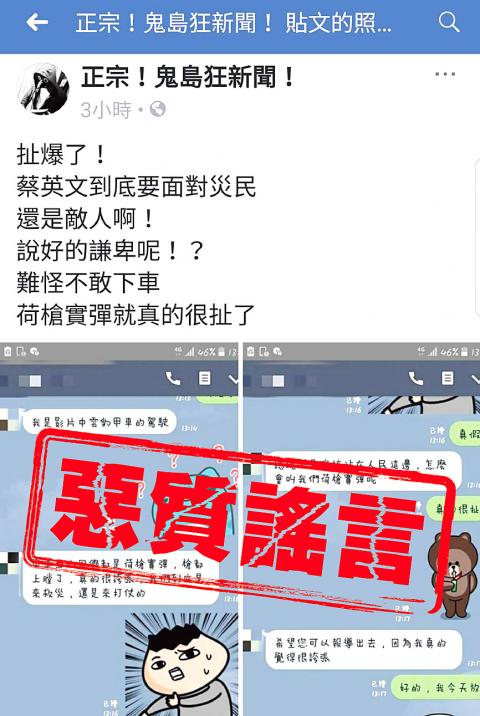Results from an online survey indicate that “fake news” reports had the potential to influence voters’ decisions in the Nov. 24 local elections last year, especially among young women with low incomes, a National Taiwan University academic said.
The survey, conducted by Wang Tai-Li (王泰俐), a professor at the Graduate Institute of Journalism, asked respondents to assess the authenticity of six false news reports widely circulated last year, Wang said yesterday.
The reports included one falsely claiming that President Tsai Ing-wen (蔡英文) was unwilling to leave an armored vehicle in Chiayi to inspect damage caused by flooding in August; a report that the government was planning to lease Itu Aba Island (Taiping Island, 太平島) to the US armed forces; and one that said the Chinese embassy had sent tour buses to Osaka’s Kansai International Airport to evacuate Chinese and Taiwanese passengers following Typhoon Jebi, Wang said.

Photo: CNA
About half of the respondents were unable to tell whether the reports were true, she said.
Supporters of the Chinese Nationalist Party (KMT) tended to be better at identifying false reports, but independent voters and Democratic Progressive Party (DPP) supporters did not perform as well, she said.
Among female respondents, 49.15 percent were unable to identify the reports as false, compared with 28.5 percent of men, Wang cited the survey as showing.
The ability to identify false reports differed with age, Wang said.
Among voters aged 20 to 30, 43.5 percent were able to identify them, while it was 59.6 percent among 50-to-59-year-olds and 55 percent for those aged 60 or over, she said.
One reason younger voters might be more susceptible to false news could be that they spend more time on social media, where it most often circulates, Wang said.
The first version of a story that people read tends to leave the strongest impression, she said, adding that they will ignore clarifications that follow.
Educational background does not appear to be an indicator of a person’s susceptibility to false reports, she said.
Among respondents with a monthly income between NT$50,000 and NT$100,000, 61 percent were able to identify false reports, while it was 37 percent among those with a monthly income under NT$10,000, Wang said.
Respondents in Taichung, and Changhua and Nantou counties were least able to identify false news, followed by those in Taoyuan, and Hsinchu and Miaoli counties, she added.

The manufacture of the remaining 28 M1A2T Abrams tanks Taiwan purchased from the US has recently been completed, and they are expected to be delivered within the next one to two months, a source said yesterday. The Ministry of National Defense is arranging cargo ships to transport the tanks to Taiwan as soon as possible, said the source, who is familiar with the matter. The estimated arrival time ranges from late this month to early next month, the source said. The 28 Abrams tanks make up the third and final batch of a total of 108 tanks, valued at about NT$40.5 billion

Two Taiwanese prosecutors were questioned by Chinese security personnel at their hotel during a trip to China’s Henan Province this month, the Mainland Affairs Council (MAC) said yesterday. The officers had personal information on the prosecutors, including “when they were assigned to their posts, their work locations and job titles,” MAC Deputy Minister and spokesman Liang Wen-chieh (梁文傑) said. On top of asking about their agencies and positions, the officers also questioned the prosecutors about the Cross-Strait Joint Crime-Fighting and Judicial Mutual Assistance Agreement, a pact that serves as the framework for Taiwan-China cooperation on combating crime and providing judicial assistance, Liang

A group from the Taiwanese Designers in Australia association yesterday represented Taiwan at the Midsumma Pride March in Melbourne. The march, held in the St. Kilda suburb, is the city’s largest LGBTQIA+ parade and the flagship event of the annual Midsumma Festival. It attracted more than 45,000 spectators who supported the 400 groups and 10,000 marchers that participated this year, the association said. Taiwanese Designers said they organized a team to march for Taiwan this year, joining politicians, government agencies, professionals and community organizations in showing support for LGBTQIA+ people and diverse communities. As the first country in Asia to legalize same-sex

MOTIVES QUESTIONED The PLA considers Xi’s policies toward Taiwan to be driven by personal considerations rather than military assessment, the Epoch Times reports Chinese President Xi Jinping’s (習近平) latest purge of the Chinese People’s Liberation Army (PLA) leadership might have been prompted by the military’s opposition to plans of invading Taiwan, the Epoch Times said. The Chinese military opposes waging war against Taiwan by a large consensus, putting it at odds with Xi’s vision, the Falun Gong-affiliated daily said in a report on Thursday, citing anonymous sources with insight into the PLA’s inner workings. The opposition is not the opinion of a few generals, but a widely shared view among the PLA cadre, the Epoch Times cited them as saying. “Chinese forces know full well that